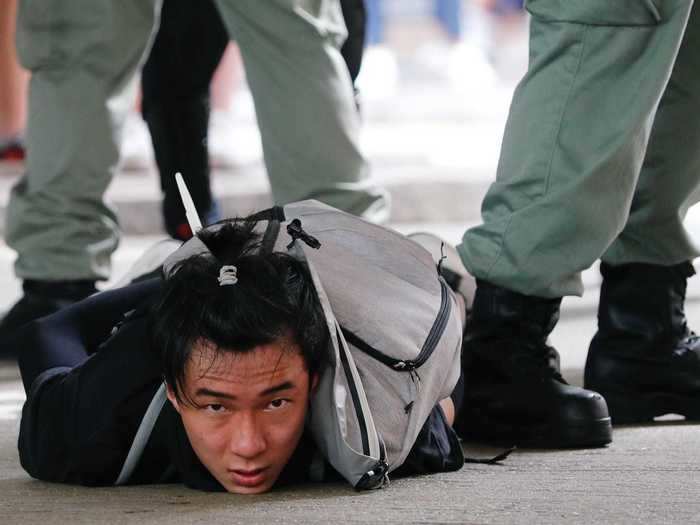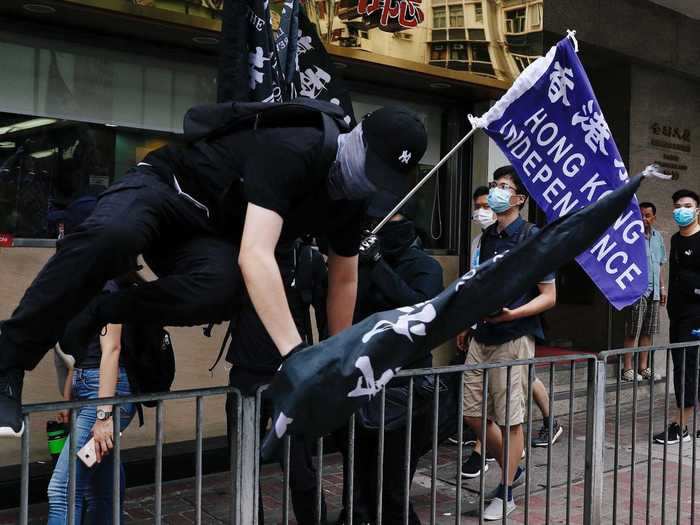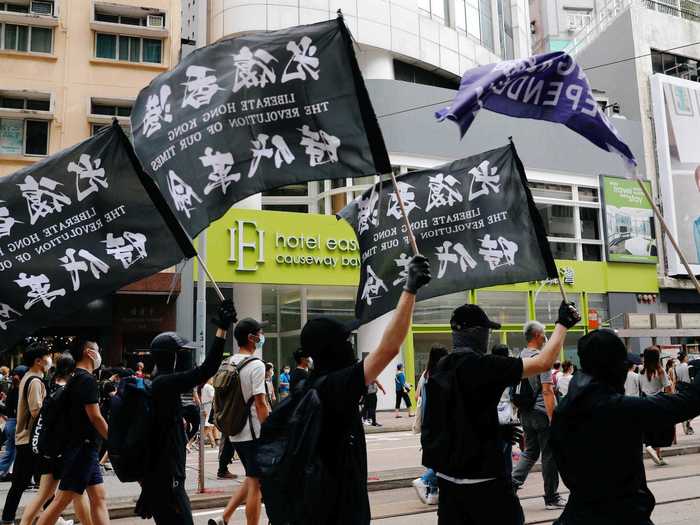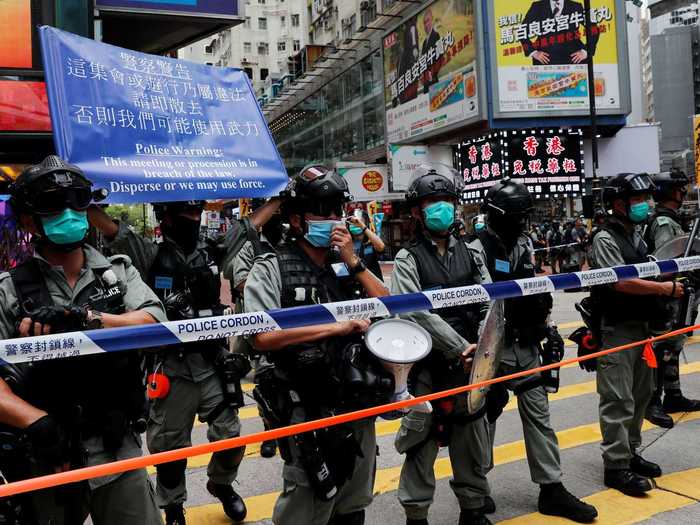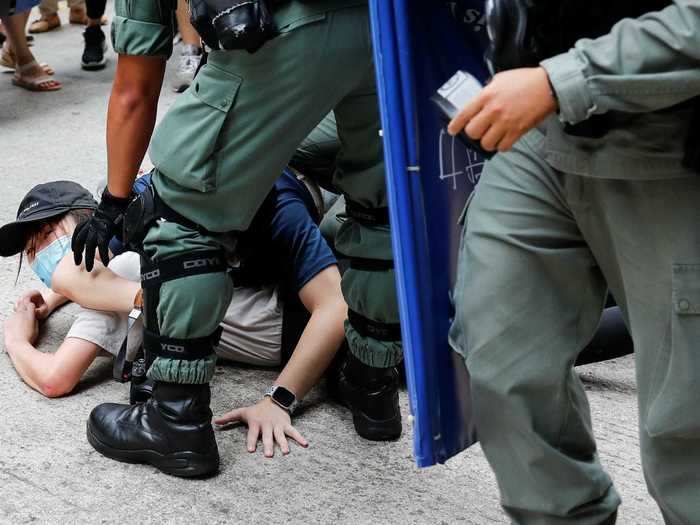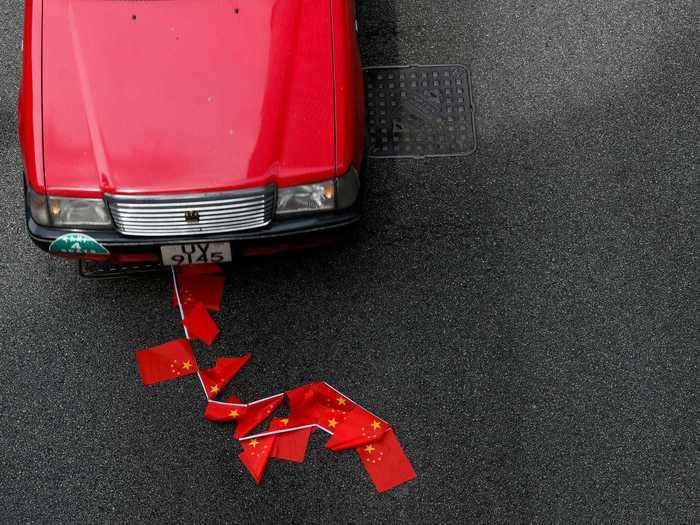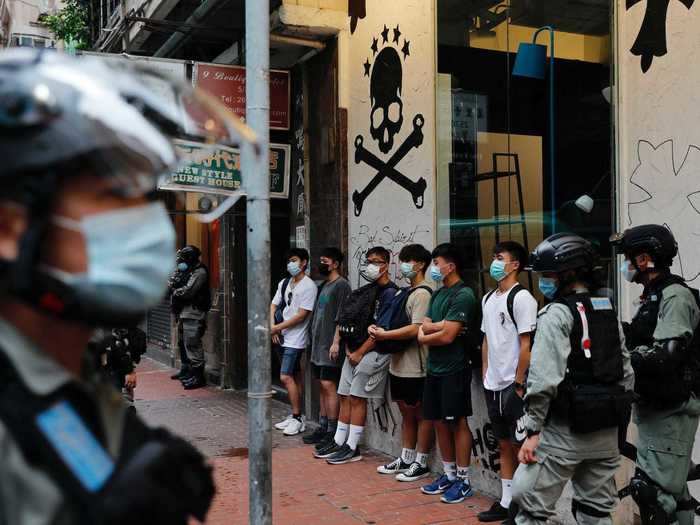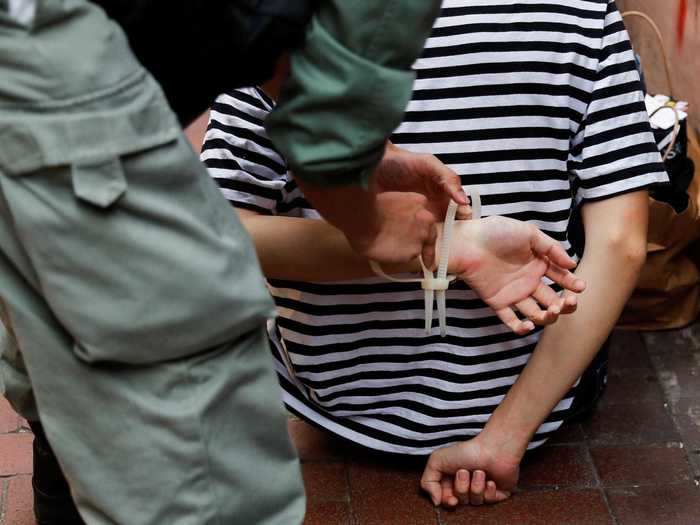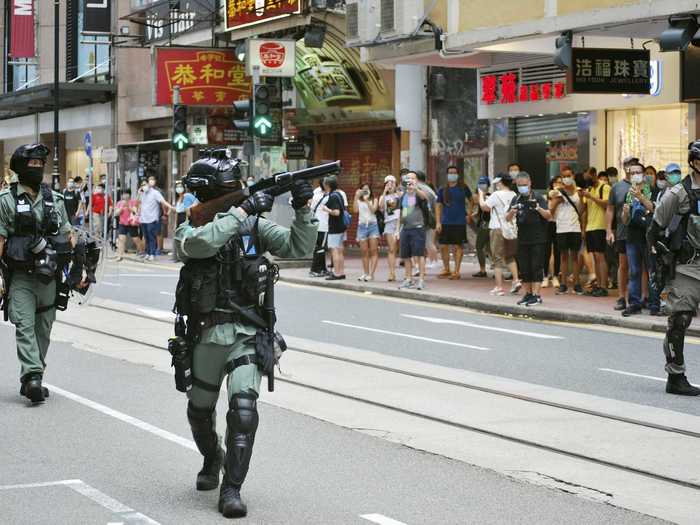Riot police officers walk as anti-national security law protesters march during the anniversary of Hong Kong's handover to China from Britain, in Hong Kong on July 1, 2020.REUTERS/Tyrone Siu
- China passed a new national security law on Tuesday, giving Beijing sweeping authority to crack down on alleged political crimes and suppress voices of the Hong Kong pro-democracy movement.
- In the first protest to take place after the vote, police in riot gear used tear gas and pepper spray to arrest more than 300 people.
- At least 10 protesters were arrested for waving flags and other materials that support the independence movement, CNN reported.
Hong Kong police in riot gear arrested at least 370 protesters on Wednesday after China passed a sweeping new national security act to crack down on political crimes and suppress voices of the pro-democracy movement.
The new law was passed on Tuesday behind closed doors, and seeks to impose penalties on acts of secession, subversion from Chinese law, terrorism, and collusion with foreign forces.
Critics fear it effectively puts an end to Hong Kong's semi-autonomous "one country, two systems," structure and allows China to punish dissent as it sees fit.
On July 1, when swarms of demonstrators showed up at a busy shopping district to protest the new law, police met them in riot gear and arrested more than 300 people.
At least 10 were arrested for waving flags or carrying materials to support the Hong Kong independence movement, which directly violates the new law, CNN reported.
These photos show the dramatic, chaotic scenes in Hong Kong this week.
On July 1, hundreds of Hong Kongers took to the streets to protest the new national security act.
Anti-national security law protesters march at the anniversary of Hong Kong's handover to China from Britain in Hong Kong, China July 1, 2020.
REUTERS/Tyrone Siu
July 1 marks the anniversary of the day that China gained control over Hong Kong from British rule in 1997. At that time, Hong Kong was designated a semi-autonomous state, with its own mini constitution called the Basic Law.
Pan-democratic legislator Eddie Chu Hoi-dick, Vice convener for Hong Kong's Civil Human Rights Front Figo Chan, and activist Leung Kwok-hung, also known as "Long Hair", march at the anniversary of Hong Kong's handover to China from Britain, in Hong Kong, China July 1, 2020.
REUTERS/Tyrone Siu
But under the new national security act, Hong Kong's freedoms are being eroded away.
A couple walks past riot police as anti-national security law protesters march during the anniversary of Hong Kong's handover to China from Britain, in Hong Kong, China July 1, 2020.
REUTERS/Tyrone Siu
On Wednesday, protesters heading toward the Causeway Bay, a popular shopping district in the city, were met by a band of police in riot gear.
Riot police officers walk as anti-national security law protesters march during the anniversary of Hong Kong's handover to China from Britain, in Hong Kong, China July 1, 2020.
REUTERS/Tyrone Siu
The police used tear gas and pepper spray to break up the demonstrations.
Riot police fire tear gas into the crowds to disperse anti-national security law protesters during a march at the anniversary of Hong Kong's handover to China from Britain in Hong Kong, China July 1, 2020.
REUTERS/Tyrone Siu
In this photo, Hong Kong police are seen targeting pepper spray projectiles at protesters.
Riot police hold pepper-spray projectiles as they disperse anti-national security law protesters during a march at the anniversary of Hong Kong's handover to China from Britain in Hong Kong, China July 1, 2020.
REUTERS/Tyrone Siu
Police also used water canons to clear the streets.
Riot police use water cannon to disperse anti-national security law protesters during a march at the anniversary of Hong Kong's handover to China from Britain in Hong Kong, China July 1, 2020.
REUTERS/Tyrone Siu
In order to try blocking the police, some protesters placed bricks throughout the roads. This tactic was used multiple times during pro-democracy protests last year.
Anti-national security law protesters place bricks on road as a road block during a march at the anniversary of Hong Kong's handover to China from Britain in Hong Kong, China July 1, 2020.
REUTERS/Tyrone Siu
Demonstrators were seen throwing mock paper money into the air as they protested the new national security act.
Anti-national security law protesters throw mock paper money during a march against national security law at the anniversary of Hong Kong's handover to China from Britain, in Hong Kong, China July 1, 2020.
REUTERS/Tyrone Siu
But the police were successful at detaining and arresting protesters.
Riot police stop and search people during a march at the anniversary of Hong Kong's handover to China from Britain in Hong Kong, China July 1, 2020.
REUTERS/Tyrone Siu
At least 370 people were arrested, which included protesters as young as 15 years old.
People are detained by riot police during a march against national security law at the anniversary of Hong Kong's handover to China from Britain in Hong Kong, China July 1, 2020.
REUTERS/Tyrone Siu
In this photo, a protester who was injured is seen being detained by police.
An injured woman is detained by riot police during a march against national security law at the anniversary of Hong Kong's handover to China from Britain in Hong Kong, China July 1, 2020.
REUTERS/Tyrone Siu
Hong Kong police said some of the arrests were made for offenses like "unlawful assemblies, disorderly conduct in public places [and] furious driving." But at least 10 people were arrested for carrying materials displaying independence slogans.
Riot police walk past a fire set by anti-national security law protesters during a march at the anniversary of Hong Kong's handover to China from Britain in Hong Kong, China July 1, 2020
REUTERS/Tyrone Siu
On June 30, police were told to arrest anyone in violation of the new law who was seen waving independence flags or chanting pro-democracy slogans, CNN reported.
A man lies on the ground as he is detained by riot police during a march against the national security law at the anniversary of Hong Kong's handover to China from Britain in Hong Kong, China July 1, 2020.
REUTERS/Tyrone Siu
One of those arrests included a man holding a pro-independence flag, while another was a woman holding an independence sign.
An anti-national security law protester holds a Hong Kong independence flag as he marches at the anniversary of Hong Kong's handover to China from Britain in Hong Kong, China July 1, 2020.
REUTERS/Tyrone Siu
Under the national security act, any act or attempt of secession, subversion from Chinese law, terrorism, or collusion with outside forces is deemed illegal.
An anti-national security law protester holds a Hong Kong independence flag as he marches at the anniversary of Hong Kong's handover to China from Britain in Hong Kong, China July 1, 2020.
REUTERS/Tyrone Siu
But the language of the law is ambiguous, and many fear the Chinese government will use its new authority to impose a broad range of penalties on Hong Kongers.
Riot police stand in line as anti-national security law protesters march at the anniversary of Hong Kong's handover to China from Britain in Hong Kong, China July 1, 2020.
REUTERS/Tyrone Siu
According to the law, the punishment for acts of secession could include between three and 10 years of life in prison. Protests that result in damaged property or blocked transportation could be punishable by life in prison.
A person is detained by riot police officers during a march against national security law at the anniversary of Hong Kong's handover to China from Britain, in Hong Kong, China July 1, 2020.
REUTERS/Tyrone Siu
The new law was passed unilaterally during a closed vote of China's legislative body on Tuesday, and without the consent of Hong Kong's chief executive.
Chinese national flags are seen on the ground during a march against national security law at the anniversary of Hong Kong's handover to China from Britain, in Hong Kong, China July 1, 2020.
REUTERS/Tyrone Siu
Critics of the law say it strips Hong Kong of its freedoms, and gives China sweeping authority to crush and punish dissent.
Riot police stop and search people during a march against national security law at the anniversary of Hong Kong's handover to China from Britain in Hong Kong, China July 1, 2020.
REUTERS/Tyrone Siu
The law came in reaction to last year's protests, which saw tens of thousands of Hong Kongers take to the streets to demand an end to an a Chinese extradition bill, and support a pro-democracy movement.
Riot police use cable tie to detain a man during a march against national security law at the anniversary of Hong Kong's handover to China from Britain, in Hong Kong, China July 1, 2020
REUTERS/Tyrone Siu
Fearing the effects of the new law, some political and activism groups have already disbanded, while others have removed pro-democracy materials from their social media accounts.
Police officers keep watch on demonstrators in Hong Kong on July 1, 2020, who are staging a protest march against Beijing's controversial national security law for the former British colony that came into force the previous day.
Kyodo News via Getty Images

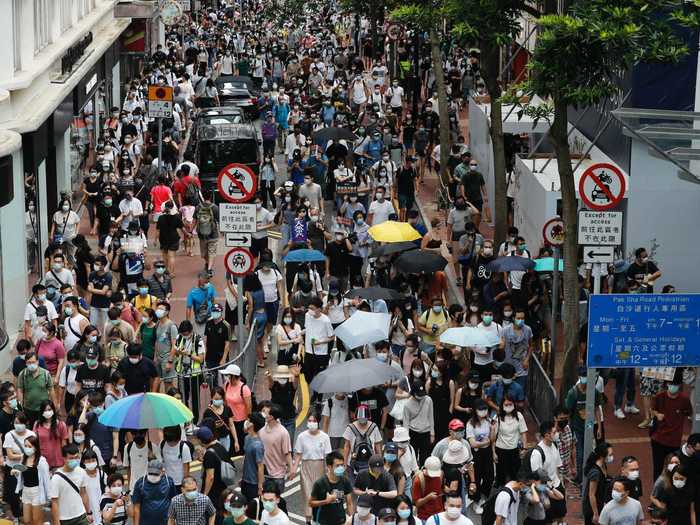
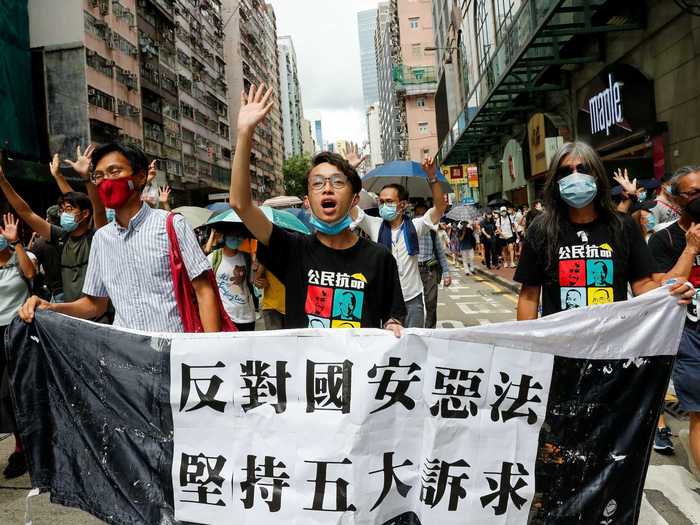
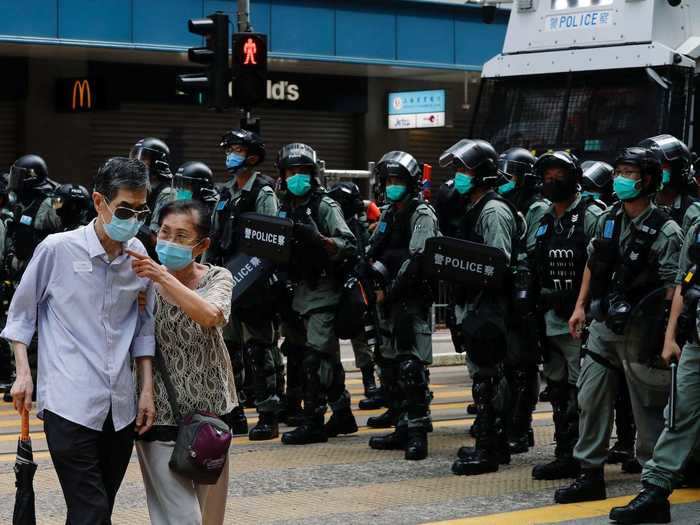
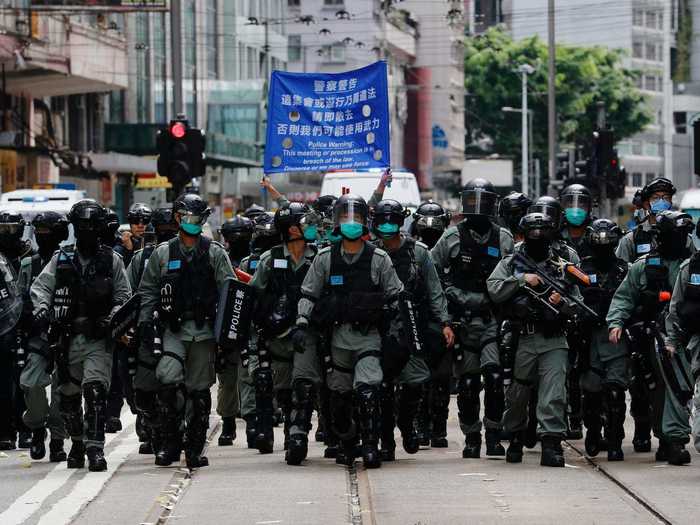
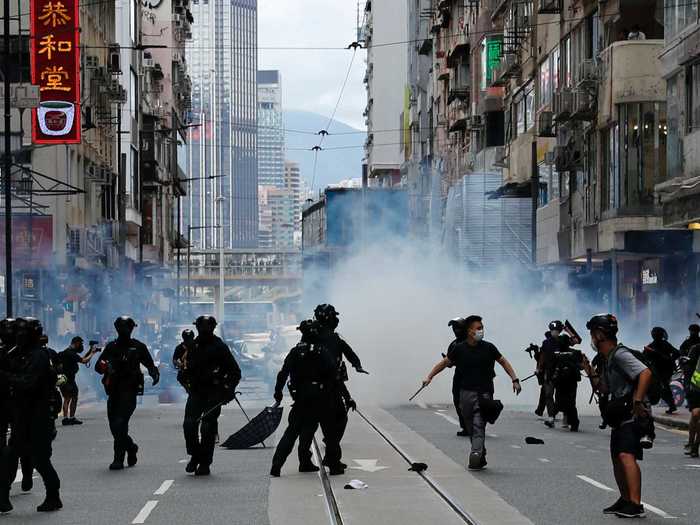
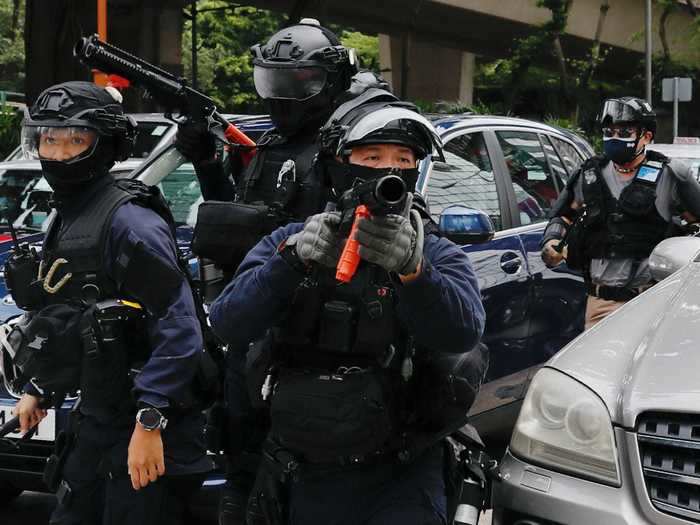
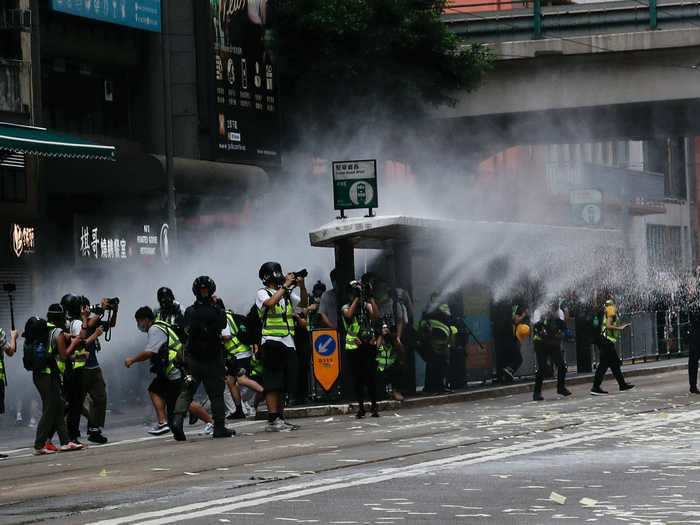
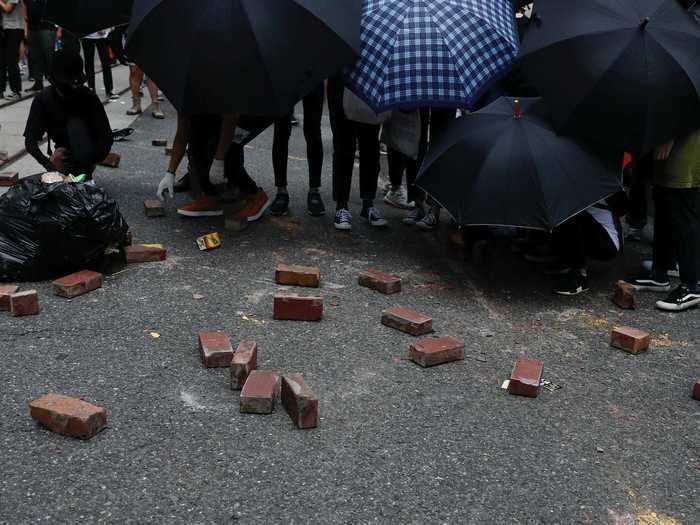
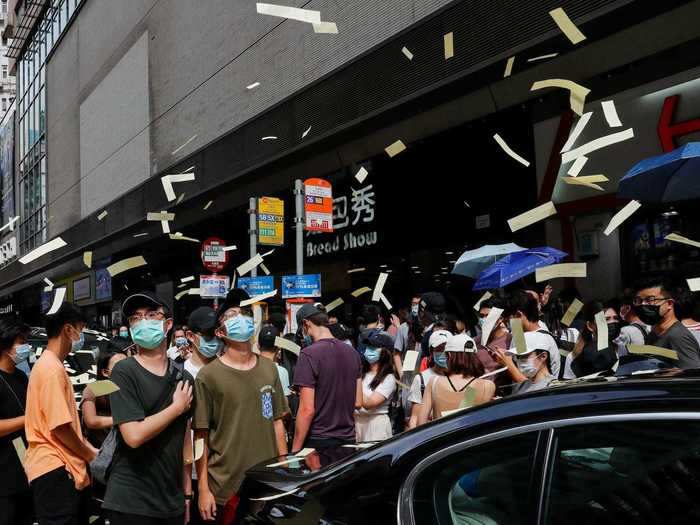
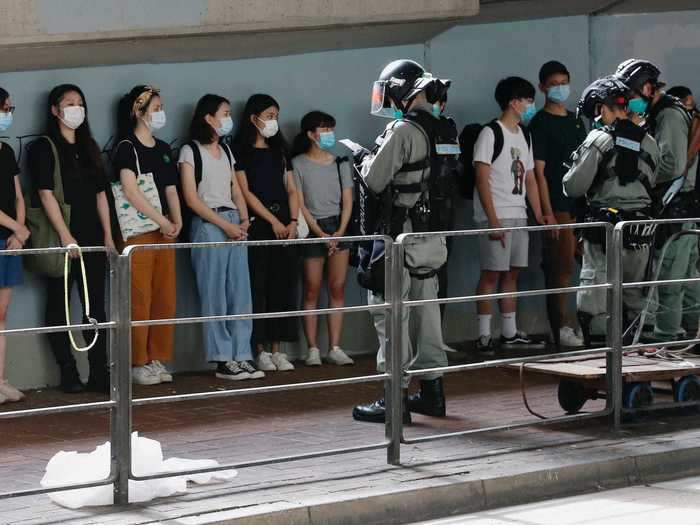
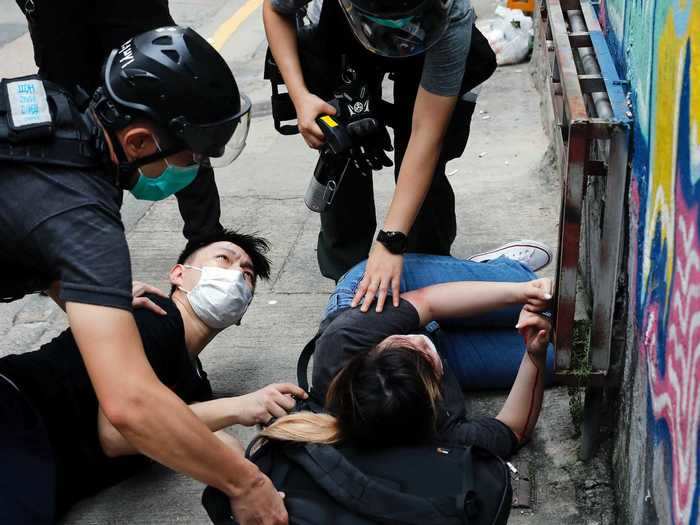
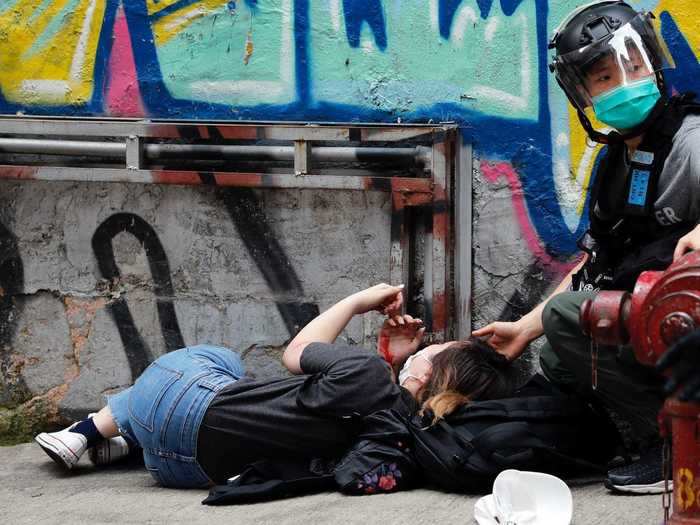
![Hong Kong police said some of the arrests were made for offenses like "unlawful assemblies, disorderly conduct in public places [and] furious driving." But at least 10 people were arrested for carrying materials displaying independence slogans.](https://staticbiassets.in/thumb/msid-76759891,width-700,height-525,imgsize-379734/hong-kong-police-said-some-of-the-arrests-were-made-for-offenses-like-quotunlawful-assemblies-disorderly-conduct-in-public-places-and-furious-driving-quot-but-at-least-10-people-were-arrested-for-carrying-materials-displaying-independence-slogans-.jpg)
